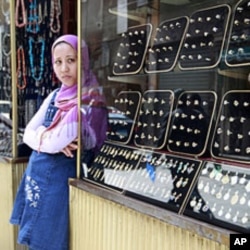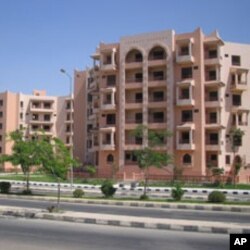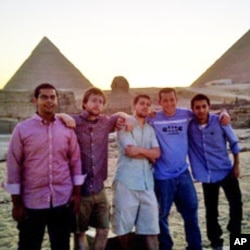Commerce in Egypt goes back as far as the pharaohs. The Tahrir revolution and the anticipated parliamentary and presidential elections could open new doors for Egyptian businessmen, if the country adopts a more liberal, pro-business stance to attract foreign investment and grow the middle class. But some entrepreneurs aren’t waiting for political cues.They are already getting started.
A new reality is emerging in post-revolution Egypt where young mavericks with interesting business ideas are getting the mentorship they need, thanks to a U.S. organization that is training young Egyptians how to succeed as entrepreneurs in the global economy.
“LearnServeEgypt, a not-for-profit program, was launched in June, 2011, to create a unique curriculum that prepares young Egyptians to start businesses with social and economic impact,” said Chris Caine, the president and CEO of Mercator XXI. His organization is a global consulting firm based in Washington, D.C., that specializes in helping clients engage with the global economy.
The six-week project paired six young Egyptians and six young Americans. They spent the first two weeks in Egypt identifying “new innovative business ideas that can make a social impact in Egypt,” Caine said. In the second phase, the Americans returned home to communicate with their Egyptian partners by e-mails, video conferences and blogs, giving them a chance to acquaint themselves with the basics of conducting international business electronically. For the final two weeks, the Egyptians traveled to the United States to complete their business plans and test them with experts in the field of international business and panels of investors.
Here are some of this year’s winning ideas:
Global Egyptian Handicraft Industry in the Making?
Nada Hamada is a graduate of the American University in Cairo where she majored in marketing. She plans to raise the profile of Egyptian handicrafts in the modern world of global fashion. “My business plan is designed to revitalize Egyptian handicrafts to empower artisans throughout Egypt,” she said.
“Through training, better design, branding and marketing the new fashionable Egyptian handicrafts, they can sell internationally for triple the current prices,” Hamada said, “So the plan can create jobs, generate more income and help the Egyptian export industry.”
Hamada plans to develop distinctive handicrafts in training centers for skilled artisans on a village-by-village basis. She is also looking for investors to finance the project and leverage profits for Egypt’s craftsmen in a $150 billion worldwide fashionable handicraft industry, according to recent reports published by the U.S. Agency for International Development.
The new line of Egyptian handicrafts will target customers in the world’s upper and middle classes who might find an interest in Egyptian heritage and are willing to pay higher prices for higher quality Egyptian products, Hamada said.
Alternative energy running alternative systems
Another idea seeks to harness the sun to heat Egypt’s water supplies.
“My business plan offers cheap and high-quality solar water heating systems to gradually replace the heavy use of Egyptian natural gas,” said Abel Rahman Khalifa, a student at the American University in Cairo. Khalifa estimates that Egypt’s heavily subsidized consumption of traditional energy will run out in 26 years according to a study by our team,” Khalifa said.
“At first, the solar water heaters will be widely marketed in the new cities, like New Cairo,” he said, where year-round sunshine and large homes look like a good fit. “It would make sense for house owners to use them as an economic alternative to natural gas heaters.”
“The government is subsidizing conventional energy resources like natural gas, oil and even electricity,” Khalifa said. The Egyptian government used to allocate billions of dollars to subsidize oil and electricity consumption, but in post-revolutionary Egypt, the government will have to reallocate huge energy subsidies to fund public health care programs and improve education. When that happens, Egyptians will need to conserve energy. That is where Khalifa sees his new solar market.
“Once the government decides to cut these subsidies or reduce them, customers would resort to alternative energy like the solar energy and that would push the demand on products such as the solar water heaters,” says Kahlifa. He also envisions that manufacturing, distribution and installation of the solar water heaters would create a substantial number of new jobs.
Investment in helping people with disabilities
Another business plan conceived by young partners in the LeaveServeEgypt project is designed to create jobs for disabled Egyptians. Although Egypt ratified the U.N. convention on the rights of persons with disabilities back in 2008, few disabled Egyptians have been integrated into the country’s workforce since then. The business plan is called “Istiqlal,” an Arabic word for independence. According to the plan, a non-governmental organization would be established to create job opportunities for the disabled, allowing them to lead more independent and productive lives.
Caine designed the LearnServeEgypt program to not only assist the people of Egypt in the short term, but also to create a lasting macroeconomic impact. He partnered with the Institute for Education in Washington, D.C., in June of 2010, which also acknowledges that entrepreneurial development is increasingly crucial for post-revolution Egypt.
Over the course of six weeks, the cooperation between Egyptian and American innovators has produced three notable projects, which are just beginning to come to fruition. More business plans are likely to follow, empowering and offering brighter opportunities for those who for decades have been trapped on the bottom of Egypt’s economic pyramid.








